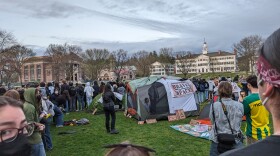Last week, students, faculty and staff at the University of New Hampshire received an email from UNH president Mark Huddleston condemning a recent spike in incidents of hate speech on campus. NHPR’s Jason Moon visited campus to see how the school community was responding to the letter.
Kristina Durocher is the Director of the Museum of Art at UNH. On the day before Thanksgiving, while most students had already left for the holiday, she headed into work as usual.
And that’s when she found something that bothered her: A poster that read, "UNH to Kill Harambe."
"These were left around campus," Durocher recalled. "So when we came into work today, we found these posters and then bananas placed around the building."

The poster refers to an incident that happened earlier this month at UNH, when someone — thought to be a student — protested a UNH College Democrats rally while dressed as Harambe, a Cincinnati Zoo gorilla that was fatally shot after a child fell into its enclosure in May.
Since then, Harambe has become a popular internet meme, sometimes used in racist attacks on African Americans. And it’s that connection that bothers Durocher when it comes to the posters and bananas scattered around campus.
“It’s disheartening," Durocher said. "I believe that there’s a legitimization of this kind of language on campus, which I think makes for a difficult workplace. And, as a student, it probably makes for a difficult learning environment, when racist language and racist activity become normalized as part of political speech.”
It’s hard to say whether the costume or the bananas were definitely racially motivated in this instance. Whoever was wearing the costume has not identified themselves.
It’s also not clear if Huddleston was referring to this incident when he penned his letter to the campus community last week. His letter referred to racial slurs, spitting, bullying and vulgar emails.
But to some, this incident seems like it's part of a larger trend of increasing hate speech at college campuses since the presidential election.
At Keene State College, graffitied swastikas were recently found burned into the ceiling of a dormitory.
And nationwide, the Southern Poverty Law Center has recorded more than 100 reports of hate incidents at colleges and universities since the election.
Back at UNH, one student who hadn’t left for Thanksgiving was Mirkat Oshone, a doctoral student studying civil engineering. Oshone says she hasn’t personally experienced any incidents of hate speech, but it does concern her to learn that it’s happening on campus.

“Because I don’t want to think like that," Oshone says. "When you hear about this type of thing, you start thinking about those kind of things, and I want to just think of myself as the same as people of other races.”
But, she adds: If the problem exists, the campus should talk about it.
Jaime Nolan with UNH's Office of Community, Equity and Diversity agrees.
“I think it’s really important that we do both what we can to protect those who feel most vulnerable," Nolan says, "while at the same time, seek for ways to create better relationships through meaningful connections with others who perhaps don’t represent our point of view — who feel isolated and disconnected in other ways.”
Nolan's office is planning a year’s worth of programming designed to facilitate conversations on campus about upholding free speech while making everyone feel welcome.
In the meantime, Huddleston’s letter encouraged students, faculty and staff to use the Thanksgiving holiday as a time to quietly reflect on the UNH community.








